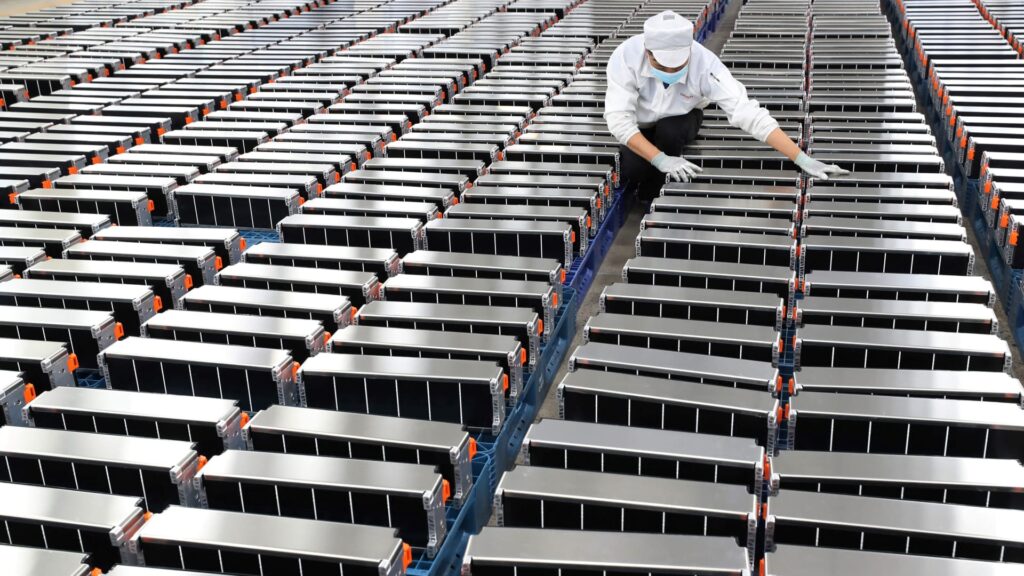The race for next-gen EV batteries may soon pivot to semi-solid-state

Car batteries at a factory in Nanjing in China’s eastern Jiangsu province.
Str | Afp | Getty Images
PARIS, France — The push to commercialize solid-state batteries for electric vehicles (EVs) is well underway, but analysts say auto giants could be on the cusp of turning to a different kind of transformative science.
Solid-state batteries have long been billed as the “holy grail” of sustainable driving. As the name suggests, solid-state batteries contain a solid electrolyte, made from materials such as ceramics. That makes them different from conventional lithium-ion batteries, which contain liquid electrolyte.
This next-generation technology theoretically packs more energy into each unit of volume than lithium-ion batteries. Proponents say it offers safer, cheaper and more powerful batteries for electric vehicles (EVs), as well as faster charging times.
Automakers have invested billions of dollars in solid-state battery research and teamed up with developers to produce their own versions for mass production.
A sign is displayed outside a Toyota Motor Corp. dealership on Jan. 30, 2024 in Tokyo, Japan.
Tomohiro Ohsumi | Getty Images News | Getty Images
Japan’s Toyota, for instance, has said it is aiming to bring solid-state batteries into mass production between 2027 and 2028. The automaker said a recent breakthrough in its bid to improve the durability of its technology means the battery is expected to offer a range of 1,000 kilometers (621 miles) and a charging time of just 10 minutes.
Japan’s Nissan said in April that it plans to launch solid-state batteries for EVs by early 2029, while Germany’s Mercedes-Benz Group and U.S. battery startup Factorial said in September that they are working together on a solid-state battery that will be ready for production by the end of the decade. Factorial also has joint development agreements with automakers including Stellantis, Hyundai and Kia.
The average range for EVs in the U.S. is nearly 300 miles (or 483 kilometers) on a single charge, according to the Environmental Defense Fund, while the time it takes to charge a battery-powered EV can take 20 minutes or several hours, depending on the car and the speed of the charging point.
Max Reid, an analyst at Wood Mackenzie, said solid-state batteries are at the start of a long journey toward commercialization.
“Obviously, the results are looking very promising — much safer, much greater energy density and particularly the charging speeds, which we think is probably one of the main benefits of solid-state,” Reid told CNBC via video call.
Yet, despite growing hype over the potential rollout of solid-state batteries, analysts remain skeptical about when they will actually make it to market.
Semi-solid-state batteries
One major drawback with solid-state batteries, Wood Mackenzie’s Reid said, is the swelling of the battery during charging and, ultimately, the degradation of the cell after extensive recharging.
“Five years ago, if we talked about this, I would have been so excited about solid-state batteries,” Julia Poliscanova, senior director for vehicles and e-mobility supply chains at the campaign group Transport & Environment, told CNBC at the Paris Motor Show.
“But somehow within this space between pilots and commercialization, there is some kind of barrier today, some kind of blockage because every time I speak with automotive executives at battery conferences, I keep hearing the same answer: ‘We are five to seven years away.'”
“When you look at the current technology, the lithium-ion batteries, they have just been improving so much. The incremental improvement of a cheaper technology has been so good that maybe it’s not so attractive anymore to put all that attention on solid-state,” Poliscanova added.
There could be another option, however: semi-solid-state batteries. These cells use a hybrid design of solid electrolyte and liquid electrolyte — and some analysts say they could serve as a bridge between the two types of batteries.
Visitors look at the booth of Catl at the 2023 Shanghai Auto Show in China.
Cfoto | Future Publishing | Getty Images
Semi-solid batteries have already been commercialized “to quite a good extent” in China, Reid said, “and actually, my opinion is that, this is the compromise technology that actually will do away with the need of a full solid-state.”
“Given slower [EV] demand in the West and these issues with solid-state, you might see some negative announcements or not-so-positive announcements for full solid-state and actually a bit of a pivot to semi-solid once that’s realized to be a better transitional technology for what this decade needs,” Reid said.
The development of semi-solid-state batteries is primarily being led by Chinese companies, including CATL, one of the world’s biggest battery producers, and the likes of WeLion, Qingtao Energy and Ganfeng Lithium.
Chinese EV maker Nio has already commercialized 150-kilowatt hour semi-solid-state batteries for its EVs, with a range of up to 1,000 kilometers. Separately, Ganfeng LiEnergy, a subsidiary of Ganfeng Lithium, is producing semi-solid-state batteries for EVs with a range of 530 kilometers.
Lithium-based batteries ‘still the way to go’
Transport & Environment’s Poliscanova said she is seeing progress on semi-solid-state batteries in China, “because whoever it is that understands how to make batteries will always be making the next one.”
“I think there has been a lot more attention and commercialization to the lower cost innovations as opposed to solid-state. It must be because within the vehicle space, the performance is already good enough. Yes, we can talk about trucks and planes, but in the vehicle space, 600 to 800 kilometers is fine. It’s enough,” she added.

Not everyone is convinced of an imminent pivot to semi-solid-batteries — or the hype over the mass rollout of solid-state batteries in the next few years.
“The reality is that for now, when we’re looking at the EV space, lithium-based batteries [are] still the way to go,” Michael Widmer, head of metals research at Bank of America global research, told CNBC’s “Squawk Box Europe” on Oct. 9.
“That’s the mainstay and it will probably stay like that for the next five to 10 years,” he added.
#race #nextgen #batteries #pivot #semisolidstate
News plays a pivotal role in our lives by keeping us informed and connected to the world. It serves as a critical source of information, offering updates on current events, politics, economics, science, and more. Through news, we gain awareness of global issues and local developments, helping us make informed decisions in our personal and professional lives. News also fosters discussion and debate, encouraging critical thinking and perspective-taking. Moreover, it promotes transparency and accountability among governments, businesses, and other institutions. In a rapidly changing world, staying updated with the news enables us to adapt to new challenges and opportunities, shaping our understanding of the complexities of society. Ultimately, news is not just about information; it empowers us to participate actively in the world around us, contributing to a more informed, engaged, and responsible global citizenry.
Health is fundamental to our well-being and quality of life, making it an essential aspect of daily existence. It encompasses physical, mental, and emotional aspects, influencing our ability to function effectively and enjoy life fully. Prioritizing health allows individuals to maintain optimal physical fitness, reducing the risk of diseases and promoting longevity. Mental health, equally crucial, affects our cognitive abilities, emotional stability, and overall happiness. Investing in preventive healthcare through exercise, balanced nutrition, and regular medical check-ups helps in early detection of potential health issues, ensuring timely intervention and treatment. Beyond individual benefits, a population’s health impacts societal productivity and economic stability. Governments and organizations worldwide emphasize public health initiatives to address pandemics, health disparities, and promote overall well-being. Ultimately, health serves as the foundation upon which we build our lives, influencing our ability to pursue goals, nurture relationships, and contribute meaningfully to society.
Money plays a crucial role in our lives as a means of financial security and freedom. It enables us to meet basic needs such as food, shelter, and healthcare, while also providing opportunities for education, travel, and personal growth. Beyond material comforts, money facilitates social connections and experiences that enrich our lives. It empowers individuals to invest in their futures, whether through savings, investments, or entrepreneurial ventures, thereby fostering economic stability and growth. However, the pursuit of wealth should also be balanced with ethical considerations, as money can influence relationships and societal dynamics. Responsible management of finances is key to achieving long-term goals and mitigating financial stress. Ultimately, while money is a tool for achieving aspirations and fulfilling desires, its true value lies in how it is utilized to improve both personal well-being and the broader community.
Earning Easy Money in 2024: Opportunities and Considerations 💸
In 2024, the landscape of earning easy money presents diverse opportunities, albeit with considerations. The digital age offers platforms for freelancing, online trading, and e-commerce, allowing individuals to leverage skills and creativity for financial gain. Cryptocurrency investments continue to allure with potential for quick profits, yet they entail high volatility and risk. Moreover, the rise of the gig economy enables flexible work arrangements through apps and websites, offering quick payouts but often without job security or benefits. Passive income streams such as rental properties and investments in stocks or bonds remain viable, but demand initial capital and ongoing management. Amid these options, caution is essential to avoid scams and unsustainable ventures promising overnight success. Ultimately, while the allure of easy money persists, informed decisions, diligence, and a long-term perspective are crucial for sustainable financial growth and security in the dynamic year ahead.



